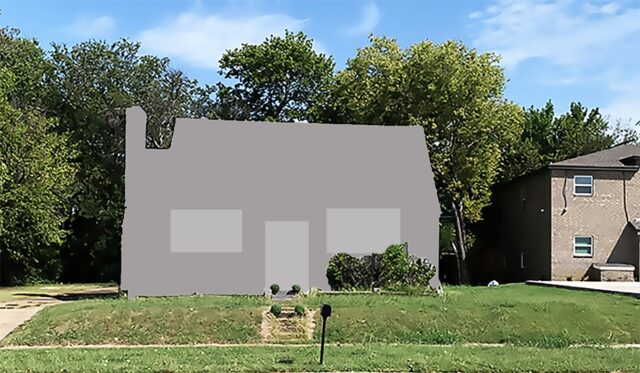

The Oklahoma Supreme Court will hear the appeal of a Cherokee Nation citizen who argues state courts lacked the civil jurisdiction to rule on her eviction in a case that could affect eviction proceedings throughout the eastern half of Oklahoma. The case — Paul-Lucas v. Paul-Craven — could become one of the first to address the unclear civil-law effects of the McGirt v. Oklahoma decision, which functionally upheld much of eastern Oklahoma as a series of Indian Country reservations.
While the McGirt decision held the state of Oklahoma lacks criminal jurisdiction over tribal citizens who commit crimes within reservation boundaries, it did not directly address civil jurisdiction. Many state officials have argued that McGirt only applied to matters of criminal jurisdiction, while some tribal governments have argued in court filings that their reservation status can affect various civil issues as well.
Jakob Lancaster, an attorney with Legal Aid Services of Oklahoma who represents the evicted tribal citizen, has asked the Oklahoma Supreme Court to find that the general rules for Indian Country jurisdiction are settled on the federal level and that state courts should simply apply those rules to the reservations in Oklahoma.
“We now know that most of the state is covered in Indian Country, and that doesn’t change any of the rules about jurisdiction in Indian Country. It just means all of them apply here,” Lancaster said in an interview. “They should have been applied here from the beginning, because it’s not as if these reservations appeared out of nowhere when McGirt was held. The fact is, the reservations have been here the whole time, and Oklahoma has been ignoring them.”
The case of Alicia Stroble pending before the state Supreme Court after oral arguments earlier this year involves Oklahoma’s tax jurisdiction, another type of civil jurisdiction. The already complicated rules for civil jurisdiction in Indian Country have also been modified by legislation unique to Oklahoma, such as a famous rider supported by the late U.S. Sen. Jim Inhofe that prevents tribal governments in Oklahoma from administering environmental regulations through the “treatment as a state” program without the state government’s consent.
According to court filings, the new eviction case stems from a family dispute over a property in Tulsa. Delilah Paul, a grandmother of the family, owned the property and allowed her granddaughter, Jasmine Paul-Craven, to live there.
Paul-Craven, a Cherokee Nation citizen, claims to have lived in the home located within the Cherokee Nation Reservation since 1989, and she claims that her grandmother promised her she would inherit it. While she never paid rent or had a written lease, Paul-Craven lived in the home for decades and spent more than $40,000 improving the property, according to her court filings.
Her aunt, Delilah Paul-Lucas, filed a quit claim deed transferring the house from her mother to herself in December 2023. Paul died a few months later in March, and Paul-Lucas filed to evict Paul-Craven from the home in May.
After Tulsa County Special Judge Tammy Bruce ruled the state district court had jurisdiction to hear the case in August, Paul-Craven appealed the ruling. The Oklahoma Supreme Court retained the case Sept. 5, although a scheduling order had not been filed by the publication of this article.
Paul-Lucas’ attorney, Nathan Milner, said the appeal by Paul-Craven is an attempt to “evade, elude, and avoid (the) inevitable” outcome of the eviction case.
“Legal Aid (is) trying to make a bigger claim than what it really is,” Milner said in an interview.
Lancaster emphasized he preferred not comment on his cases before any appeal is complete, but he briefly responded to Milner’s criticism.
“The rules of jurisdiction regarding states and tribes are set at the federal level. It comes from Congress, it comes from the Supreme Court of the United States,” Lancaster said. “If they say — and they do say — that states can’t exercise jurisdiction over an Indian defendant when the cause of action arises on their own tribe’s reservation, then that’s it. That’s it, bottom line. It doesn’t matter how big or small the case is, the state does not have jurisdiction.”
Oklahoma Supreme Court’s Indian eviction caselaw
The Oklahoma Supreme Court has yet to rule on the question of whether a state court has jurisdiction to hear a forcible entry and detainer action, or an eviction, filed against a tribal citizen living on their tribe’s reservation. However, the court has ruled previously that state courts lack jurisdiction to hear eviction actions in “Indian County,” a term of art that refers to land held in trust by the U.S. federal government for tribes, “dependent Indian communities” or land within an Indian reservation.
Both of the prior cases before Oklahoma’s high civil court were decided decades prior to McGirt and before reservations in eastern Oklahoma regained legal recognition. In 1983, the court held in Ahboah v. Housing Authority of Kiowa Tribe of Indians that state courts lacked jurisdiction to hear an eviction case involving tribal citizens on allotments, which are individually owned parcels usually treated like land held in trust. In 1990, the court went further in Housing Authority of the Seminole Nation v. Harjo and ruled that state courts could not hear eviction cases involving Indians arising from “dependent Indian communities.”
Since prior to McGirt there was an erroneous belief — even among some tribal leaders — that Oklahoma did not have Indian reservations, the court appears never to have entertained an eviction case involving reservation land.
While both the Ahboah and Harjo cases were cited by Lancaster, Paul-Craven’s attorney, the district court judge appeared ultimately persuaded by the argument of Milner, Paul-Lucas’ attorney, that Oklahoma’s more recent Milne v. Hudson decision from 2022 was controlling precedent.
The Milne case asked whether state courts had civil jurisdiction to issue protective orders when both parties were tribal citizens with conduct that occurred on a reservation. The Oklahoma Supreme Court determined that state courts do have concurrent jurisdiction with tribal courts to hear those cases. In reaching that conclusion, Justice Dana Kuehn said the court uses a two-part test “to determine whether state courts have jurisdiction where Indian interests are concerned.”
“We must discover whether Congress has explicitly withdrawn state court jurisdiction, or whether the interest infringes on tribal self-government,” Kuehn wrote in 2022.
Kuehn also said in a footnote that the court had “effectively” overruled both Ahboah and Harjo in the 1994 case Lewis v. Sac and Fox of Oklahoma Housing Authority.
In the context of evictions, there is no federal statute prohibiting state court jurisdiction, so Milner argued that the district court should determine whether allowing the eviction would infringe on tribal self-government and that the tribe had the same interests as the state in adjudicating the eviction.
Court likely to examine ‘direct effect’ of evictions on tribes
The U.S. Supreme Court held in the 1981 case Montana v. United States that tribal governments generally lacked civil jurisdiction over non-Indians unless the non-Indian either entered “consensual relationships with the tribe or its members, through commercial dealing, contracts, leases, or other arrangements,” or if the non-Indian’s conduct “threatens or has some direct effect on the political integrity, the economic security, or the health or welfare of the tribe.”
The Oklahoma Supreme Court adopted virtually the same test in its 1994 Lewis decision and recently reaffirmed it in the 2022 Milne decision, meaning future briefs in the Paul-Craven eviction case will likely focus on applying the Montana test to the question of evictions.
Most eviction cases involve a written lease which could be interpreted as a “consensual relationship” with a tribal member that would trigger the first prong of the Montana test, but since there is no written lease between the familial parties, the focus of the appeal may hinge on the second prong: whether allowing state eviction proceedings harms the “political integrity,” “economic security” or “health or welfare of the tribe.”
In his briefs, Milner has argued that the state and tribal governments have overlapping interests in eviction cases and therefore it would not threaten or have an effect on the tribe. He said the same in an interview.
“(There is) not a defining boundary that excluded each jurisdiction,” Milner said of the Cherokee Nation and Tulsa County. “They’re overlapping.”
Lancaster, meanwhile, has argued that the right to “tribal self government” would be harmed by allowing state jurisdiction. Both parties will likely file more detailed briefs on the issue in the coming months, and the Supreme Court could receive several requests to submit amicus briefs from tribes and other interested parties.
“In the last case where I tried to make this argument, there were apartment associations all over the state that just came out of the woodwork and started wanting to give their two-cents on the issue,” Lancaster said in an interview. “I don’t even know how they found out about it.”
Lancaster also briefly mentioned the potential effects of tribal courts collecting fees from eviction cases instead of district courts, hinting at how jurisdictional disputes affect government revenue.
“Evictions are really so high volume that I think it could really generate a lot of fees for tribal courts,” Lancaster said. “Those fees could be used to expand the tribal courts. I know there’s been some talk of opening up satellite courthouses in Tulsa County and this is the kind of thing — I think — which could make that possible.”
Missing from the district court briefs was a strong analysis of the potential tribal interests in the case. Tribal governments may have an interest in protecting their citizens’ right to live within their own tribe’s reservation. Similarly, allowing state governments to evict tribal citizens from houses on reservations — potentially forcing them to seek off-reservation housing — could affect the tribe’s “political integrity,” especially for tribes where voting is linked to reservation residence.




















